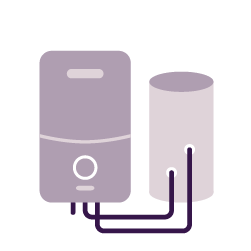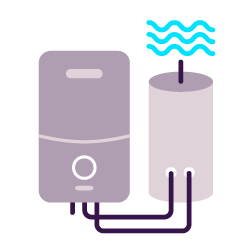Your ultimate combi boiler guide
What is a combi boiler?
Combination boilers, more commonly known as combi boilers, are an all-in-one heating system for your home. They provide instant hot water on demand, without the need for a hot water cylinder or cold water tank.
Combi boilers explained.
Check out this quick video guide to combi boilers and find out if they’re the right choice for your home.
How do combi boilers work?
They heat water on demand directly from your mains water supply. When you turn on your heating or hot water it will trigger your boiler to start burning fuel, which is used to heat the cold water using a heat exchanger. This is then transported around your home to your taps, showers, and radiators.
Many new combi boilers will also have a small reservoir of hot water stored within to help provide hot water immediately.
What is the difference between a combi boiler and a regular or system boiler?
Choose the right boiler type for your home with our quick comparison.

Combi boilers
Space saving combi boilers heat water on demand so it never runs out. Plus, you don't need additional water storage tanks. However, they can struggle with high demand from multiple taps at once. They use your mains water pressure.
Best suited for: small or medium homes with good water pressure.

System boilers
System boilers use a hot water tank to store pre-heated water, which is usually kept in an airing cupboard. However, they do not need a cold water tank, as they are supplied directly from the mains - meaning they use your mains water pressure. If your hot water runs out you will need to wait for the tank to refill.
Best suited for: homes with high hot water demand and good mains water pressure.

Regular boilers
Regular boilers need the most space. They are gravity fed, so they must collect cold water from your mains supply in a tank in your loft. Then they store pre-heated water in a hot water cylinder. If your hot water runs out you will need to wait for the cylinder to refill.
Best suited for: large homes with high hot water demand and low water pressure, or homes with old radiator systems.
What are the advantages of a combi boiler?
As they heat water on demand instead of storing pre-heated water on a timer, your hot water supply will be instant and won’t run out. Plus, you won’t be heating water you don’t need, helping to save energy at home.
Better yet, combi boilers are highly compact, meaning they won’t use up valuable storage space in your loft or airing cupboard.
How much does a combi boiler cost to run?
Combi boilers are generally cheaper to run than comparable regular or system boilers, as they only heat what you need.
The exact running costs of your combi boiler depend on its energy efficiency and how much you use your heating and hot water. The better your boiler efficiency the less energy it will waste - saving you money on your heating bills and reducing your carbon emissions. However, the more you use your heating and hot water, the more often your boiler will need to be on, raising the running costs.
Getting the right power boiler for your needs will help to make sure it is cost-effective. More powerful boilers will cost more to run, but if it is not powerful enough then your boiler may struggle to meet your hot water demand.
Why choose a Worcester Bosch combi boiler?
The UK’s favourite boilers.
As the UK’s market-leading domestic boiler brand, Worcester Bosch has been heating our homes for more than 50 years.
Powerful and efficient.
Worcester Bosch Greenstar condensing boilers are A-rated and up to 94% efficient - helping you waste less fuel and save more on your energy bills.
Awarded Best Buy by Which?
The Greenstar 4000 combi, is a leading Which? Best Buy. The Greenstar range uses advanced technology to create powerful boiler systems with modern designs to suit your home’s needs.
What size combi boiler do I need?
The right boiler size is ultimately determined by your heating and hot water demand, which usually increases with house size.
1-2 bedroom homes need roughly 24-27kWs.
3-4 bedroom homes need roughly 28-34kWs.
5+ bedroom homes usually need 35kWs or more.
Another rule of thumb is that you will need 1-2kWs of power for each radiator in your home.
Where can combi boilers be fitted?
You can opt to have your combination boiler fitted in a number of locations, so you can decide what best suits your home. Most are wall-mounted, but you can choose a freestanding option.
Some popular locations include:
Inside a kitchen cupboard - ideal for keeping your boiler out of view but could take up valuable kitchen storage.
Utility room - often a great choice for minimising the noise of your boiler.
Airing cupboard - often chosen if switching from a system or regular boiler, but be aware they are often close to bedrooms that could be disturbed by the noise.
Bathrooms - popular choice but must comply with additional safety regulations.
What are the disadvantages of a combi boiler?
Check if they are the right choice for your home.
They usually struggle with high demand for hot water, such as from multiple hot water taps at once, causing low water flow rate.
Low water pressure areas may be better off with a regular boiler, as combis rely on mains water pressure.
As they don’t have immersion heaters, there is no back up if they break down.
They are not compatible with power showers as they do not use a hot water cylinder.
Should I change to a combi boiler?
If you don’t currently have one, it could be worth changing if:
You want to save space.
You have good mains water pressure.
You do not often use multiple taps or showers at once.
You use hot water for long periods and often run out.
You have replaced old pipework that might have previously been damaged by high mains water pressure.